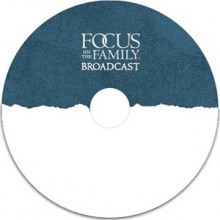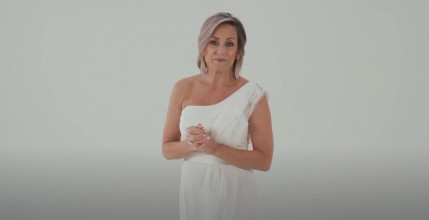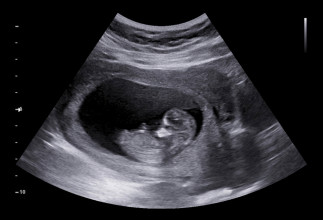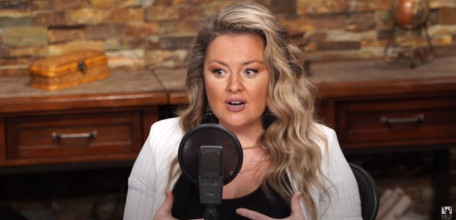John Fuller: I’m John Fuller, and today on Focus on the Family with Jim Daly, we’ll hear about one woman’s unbelievably tragic journey of risky and harmful choices that could’ve easily destroyed her life, and this is not going to be a topic for younger listeners. Uh, we need to warn you that what you’ll hear today represents, um, how lost and blind some people are today as they try to medicate and fill those holes and pains in their life with drugs and drinking and sex to the point that they lose all sense of right or wrong and can’t even comprehend the consequences of their bad decisions, and that was illustrated by this dramatized entry in Cynthia Wenz’s journal when she was just 15 years old.
Dramatized Reading: Thursday September 16th, went and had my kid murdered. They knocked me out with an IV, so I didn’t feel a thing. I wanted mine and Jay’s baby so bad.
Jim Daly: John, one of the worst tragedies in our modern world is how many teen girls and women are facing a horrific decision just like that. Maybe they’re confused and afraid. They don’t see another option. Worse, they’re not exposed to other options in some cases. Um, all too often, these girls and women don’t have anyone to confide in-
John: Mm-hmm.
Jim: … a responsible, Godly adult who might give them practical help and hope for that budding new life within them. As a result, millions of precious pre-born babies are literally destroyed every year. And, man, folks, this is why Focus on the Family has been a consistent voice for life for more than 40 years now. We believe God created each one of us in His image, believer and non-believer, which gives us great worth and importance. And in the Christian community, we have a responsibility to protect and speak up, not only for the pre-born children who are at risk of abortion, but for their mothers as well, and that’s why we’ve chosen to address this difficult, yet important topic during Sanctity of Human Life Week. And we hope what we share today, uh, will challenge you to get involved in the pro-life movement.
John: Mm-hmm. Yeah, we’ve been encouraging our Focus friends and, uh, the community of believers to continue praying about the upcoming Supreme Court decision later this year regarding Roe v. Wade in the ongoing battle to roll back pro-abortion legislation. Uh, later on today, we’ll explain how you can help save lives through our Option Ultrasound Program. Right now though, we’re going to introduce you to Cynthia Wenz. Uh, she’s an author, a speaker, a pro-life advocate. She’s written a powerful memoir about her own experiences with loss and despair from abortion. Uh, the title of her book is Healed for Life: A Story of Redemption. And we’ll encourage you to look for a copy of that at focusonthefamily.com/broadcast, or call 1 800, the letter A, and the word FAMILY.
Jim: Cynthia, welcome to Focus on the Family.
Cynthia Wenz: Thank you so much. Life matters.
Jim: It does.
Cynthia: I- I’m so appreciate you care so deeply about it.
Jim: Well, and your story is so amazing, and that’s why I’m looking forward, you know, it’s a heavy story, but what an amazing thing God has done in your life.
Cynthia: Yes.
Jim: And that’s what matters most. Let’s get right into it. You paint a picture of yourself as this vibrant, well-loved child in a loving home. Sounds like a Focus on the Family home (laughs) if you could say it that way.
Cynthia: Mm-hmm.
Jim: And describe what that younger childhood was like.
Cynthia: Oh, she was cutie patootie.
Jim: (laughs)
Cynthia: She was tiny, tiny. I was little, little, little, um, dancing on top of the Volkswagen Bug in South Philadelphia. Um, the life … You know, maybe the black sheep of the family, but the life of the family. Dancing didn’t need an audience; the audience was in my mind. You know, there was the bridge that the town homes dead in- into in South Philly, there’s the row homes and all the steps and I can remember being just larger than life, but tiny in person.
Jim: That’s so fun. I can relate. I mean, I, when I was a five-year-old boy just running around playing Batman in the alleys and having-
Cynthia: Yeah.
Jim: … a great time, right? Just trying to enjoy life.
Cynthia: Yeah.
Jim: That’s what it sounds like. Uh, we would’ve been a dynamic duo in our neighborhood.
Cynthia: (laughs)
Jim: But, uh, your grandmother, Nanny, I think you referred to her-
Cynthia: Yeah.
Jim: … she was a very important part of your life. Why and then what happened?
Cynthia: This is my mom’s mom. We’re Italian, so we kind of commune together. She lived with us until I was 12 and I remember being scared and I was under my canopy at night, and she didn’t speak English, don’t ask me why I’m not bilingual in Italian. But I understood her and there would be nights where I was the kid that would wake up in the middle of the night at 4:00AM screaming from the bad dream, for whatever was in the dream, and she would be the one shuffling down that hallway, and in her way of sharing her faith, she had that beautiful blue crystal Rosary, that was her way of giving me a piece of her faith. She’d put it in my hands, she’d pat my hands, she’d say, and in Italian, [foreign language], she’s say, you know, “It’s okay.”
Jim: Mm.
Cynthia: And I remember holding just that thing that meant something to her and I remember looking up at the canopy and I just remember feeling comforted by her faith.
Jim: In that way then, from 12 to 15, there was a bit of that wandering feeling, right? Where’s Nanny?
Cynthia: Yeah.
Jim: And where’s my rock?
Cynthia: Yeah.
Jim: And your parents weren’t doing well at the time. Describe, kind of, up until 15 when, uh, it kind of came off the rails for you. But that’s so many young people that are in homes that have a lot of destabilization and, you know, kids struggle processing that sometimes and I want to capture that for people, for parents to better understand perhaps what their 12, 13, 14-year-olds are feeling when there’s not God’s peace in the home.
Cynthia: It’s such a challenging thing, isn’t it, as a parent, how do you provide that in your imperfection?
Jim: Mm.
Cynthia: And I think if we’re sharing with parents at large, my parents got wrapped up in self. My dad, who had a very rough upbringing, abandoned in eighth grade, supported three sisters, turned to the ponies, the horse racing, gambling-
Jim: Sure.
Cynthia: … and the bottle for comfort and escape, and you could almost understand it and rationalize it. My mother was his prom date. I mean, these are South Philly kids, Italian families that grew up. My dad wanted nothing more than to be the father he never had-
Jim: Mm.
Cynthia: … and in a way, provided it in his character, his work ethic, his provision and who he was. But he couldn’t provide it emotionally and spiritually ’cause he had no point of reference.
Jim: He had no well.
Cynthia: He had no well. And when they began to do this, I began to do this.
Jim: Yeah, when they begin to separate. Yeah. In that context, 15 then became kind of a demarcation point it sounded like in reading the book that, you know, that was when you started looking for those hugs, right, in places that weren’t healthy.
Cynthia: At all (laughs).
Jim: So, describe that. Yeah.
Cynthia: Yeah, um-
Jim: I mean, this again, your story is, is not your story alone. I mean, this is a very common story, especially for teen girls that don’t feel like there’s adequate love in the home. So, that … I mean, you’re speaking to many, many people.
Cynthia: Yeah, and you’re a minor.
Jim: Yeah.
Cynthia: You’re not wired to process what’s going on, and so you grasp at things. And so, at 14 actually, looking for love in all the wrong places, I began acting out with promiscuity. I mean, we’re Italian, there’s plenty of alcohol in the house, um, and you can find the outlets and begin drinking. Of course, the neighbors didn’t help. They were down the townhouse, um, alleyway and began, um, you know … My friend and I began going over to these older men’s home and, uh, the alcohol and the drugs were provided. You know, we kind of became the object, if you will, tragic.
Jim: Mm-hmm.
Cynthia: The door was open in my home. My father was remote, my mother was working. Just because I was home alone and there were neighbors that thought I was cute; the open door does not mean walk through it. I walked through it. I was sassy. I thought I could get out there and take the world by storm, and yet, the world took me.
Jim: Wow.
Cynthia: And I naively went into those environments.
Jim: Cynthia, tell us about, um, that first abortion. What age were you? What happened and what were the circumstances?
Cynthia: So, right about this time I walked through that door, I walked into the arms of strangers. A couple of months go by, my mother realizes I have not had a menstrual cycle. I go to my mom, I said, “Mom, I’m pregnant.” She says, “I’ve noticed. You haven’t asked for feminine product. You haven’t-
Jim: Sure.
Cynthia: “I’ve noticed.” And I looked at her and she had the solution, and this is where, to your point, you can’t look back and blame, but you can look back and go, she was doing what she thought would help me.
Jim: Mm.
Cynthia: There’s a law in the land that said it was okay, and she borrowed cash so there would be no receipts for my father to see. She got her friend, Annette, who, you know, was our support system. We drove over to, you know, a road out where there was an abortion facility. She checked me in under her best friend’s name, paid cash. I had just turned 15, enter first abortion.
Jim: Wow. That journal entry that was read at the beginning of the program expressed that desire even as a, a late 14-year-old, 15-year-old, you wanted to keep the baby, and that’s what I got from that.
Cynthia: Isn’t that interesting? Yeah.
Jim: Yeah. I mean, so the longing of your heart was there, even as a young woman, a girl. Describe that.
Cynthia: Well, I didn’t know that longing was there.
Jim: Mm.
Cynthia: Here’s why. As a minor, that abortion enters in, that veil of sin comes over that young woman and she doesn’t know how to process, she has no resources to process. So, what does she do? She numbs, she acts out. So, it wasn’t until years later that I had found that journal and I remember my husband and I were decorating for Christmas and, um, pulling things out of the attic and I found the journal, “Look, oh, so sweet. Look at her handwriting.” Oh, and I hit the page and it became a trigger in my healing journey because I had thought, I had thought she just wasn’t aware, she was blindly carried away to the abortion clinic at 15 and just had no comprehension, and that diary entry, that journal entry was she knew. She knew. She was very aware that that was the taking of a life. Our children may be naïve, they be young, but they’re not blind and they’re not … They have the capacity to understand, and that journal entry showed me I understood what was going on.
John: Well, this is Focus on the Family with Jim Daly, and our guest today is Cynthia Wenz and, uh, she’s sharing with candidly about pain in her life. Um, there is hope as the story continues. Uh, but the book is called Healed for Life: A Story of Redemption. So, contact us today for your copy and keep listening. There’s a lot more to hear. Our website is focusonthefamily.com/broadcast or, uh, call 1 800, the letter A, and the word FAMILY.
Jim: Cynthia, i- in recounting that, I mean, that feeling of loneliness, I’m just touching that and hearing your heart. I can’t imagine 15 and you think your dad’s gonna go into this blazing rage. You’re whisked away secretly. Your mom, the girlfriend, all of that. It had to be such a lonely place.
Cynthia: It really was. I remember, we went from the abortion clinic to Denny’s. We went from the abortion clinic, from the removal of life from a young adolescent girl to breakfast.
Jim: Wow. And probably didn’t really talk about it.
Cynthia: Ever again.
Jim: Wow. Um, boy, I hope you feel that I can certainly see it, and that’s … I mean, I appreciate that, the vulnerability-
Cynthia: Yeah.
Jim: … of it. I mean, it’s still tender for you. Sometimes we can say these things so often that you lose the, the heart part of it, but you haven’t, and that’s amazing. And let’s keep moving.
Cynthia: Yeah.
Jim: It’s gonna get a little more-
Cynthia: (laughs)
Jim: … you know, dicey. Um, you had another heartbreaking story, um, from your book, Healed for Life, which involved … Even though I don’t wanna choose the words well-meaning coach. I mean, you had a swim coach. What happened?
Cynthia: Well, so, that’s interesting, right? So, here’s a broken child who is strong, but immature. Here’s this healing agent that comes along, perceived healing agent, we’ll say, and these coaches keep me busy. What does a young, promiscuous child looking for love, misplace?
Jim: Mm.
Cynthia: The type of love that’s being administered and I couldn’t distinguish between the two and I became, oh, wait, there’s something being given to me, and I’m being taken care of, now something is due in return, and I became the aggressor, if you will, and I don’t think it was aggressive, like, let’s … You have to remember, sex at that time was painful, but it became, I think in that young girl’s mind, a way of this must be love, therefore sex must be part of it, and it became this stumbling.
Jim: And what happened in that relationship and who was that?
Cynthia: Um, that was me aggressing, uh, displacing love for the coach, thinking you’re my savior and now I wanna put my arms around you because I wanna feel safe with you and misplacing that and taking it into a sexual relationship.
Jim: And that happened. That’s what I was getting at. That’s what I remember in-
Cynthia: That happened.
Jim: … the book, I mean, that, that he, you know, again, he’s the adult, so, he should’ve known better.
Cynthia: He should’ve known better.
Jim: But you did move in that direction.
Cynthia: Oh, yes, for three and a half years.
Jim: Ah.
Cynthia: It was when he left the picture the acting out returns, enter second abortion.
John: You sought; you sought another relationship to sooth the pain of that broken relationship.
Cynthia: Sorry, Jim, promiscuity at its best. I mean (laughs)-
Jim: No, no, I’m trying to just-
Cynthia: … the young girl acting out, yeah.
Jim: … piece that together. I mean, you were really struggling obviously.
Cynthia: Oh, yeah, absolutely.
Jim: And so, that, in essence, that third relationship also resulted in a pregnancy. Take us through that.
Cynthia: You’re very gracious to say third. I think there were many to count. When promiscuity enters a young woman’s life, promiscuity does not mean the first, the second and the third. It means where can I act out in relationship and where can I feel loved?
Jim: Yeah.
Cynthia: And it just becomes part of the norm.
Jim: Right.
Cynthia: Part of the tragic norm.
Jim: And, you know, it’s important to make this statement because some people, they haven’t had that experience, you know, they didn’t have that, that pull, they didn’t have those warring powers within them, and I, I get it. But, you know, it’s amazing and this is the statement, Jesus loves you.
Cynthia: Oh, and through it all.
Jim: Regardless of that. That’s the amazing thing. And I think we, you know, we can lean into a judgmental attitude, say, wow, Cynthia, really? I mean, how come you couldn’t get your head together on this? You know, multiple relationships, now you had an affair with your coach, you brought it on, it sounds like. So, the guilt of that, it was me being the aggressor and then a rebound relationship when you’re looking for that affection again with this next man and you get pregnant.
Cynthia: Mm-hmm.
Jim: And, I mean, I’m telling you, I just think it’s so important for people to realize, yeah, God’s love can extend to you-
Cynthia: Absolutely.
Jim: … obviously. So, keep it going. What happens in that situation?
Cynthia: And I would even go so far as to say as, it doesn’t extend to me, he was present with me the whole time-
Jim: Wow, yeah.
Cynthia: … grieving every wrong turn I took, and I later prayed that out with the Lord, you know, ’cause you can look back as a redeemed woman of God and you can go, where were you, Lord?
Jim: Right.
Cynthia: And the comfort was I was with you, you’re alive because I was with you.
Jim: Huh.
Cynthia: You’re here today because I was with you. And so, I think as adults, we need to look back and say, when sexual promiscuity, drugs and alcohol enter a young woman’s life when she’s a minor and she’s too young to process it, she becomes a predictable statistic, and she begins acting out. She may have had this affair; doesn’t mean he was the only one.
Jim: Yeah.
Cynthia: And what happens when he leaves? She goes off to college, she tries to begin a journey, a new journey and as a 19-year-old, a freshman in college, here she is with a boyfriend in college, sex is the norm. The habits have been formed. Sex is now the habit of what you do with men-
Jim: Right.
Cynthia: … because you’ve already been there. You know the sacredness of it, but you don’t know the application of how to the sacredness of it. And at 19, drinking, partying, the collegiate life that can kind of consume you, um, I entered a second pregnancy and a second termination, and it was tragic. I had gone to home to Houston, I had let him know, “I think I’m pregnant.” I went to the OBGYN. He mailed me 190 bucks, paid for the abortion. But in this particular one, I was so drugged out, zoned out, just … You kind of in your mind just, you justify, right? Your mind just goes a place where it can make it all okay. Well, I was doing drugs and it probably, you know, damaged the baby anyway and it was probably, you begin to tell yourself, it’s probably a miscarriage, it was probably-
Jim: The right thing to do.
Cynthia: Probably the right thing to do.
Jim: Yeah.
Cynthia: Yeah.
Jim: Which is kind of what the abortion industry says today, no matter what the circumstance of the young woman.
Cynthia: Oh, yeah. Yeah.
Jim: This is always the right thing to do and that’s the problem that we have-
Cynthia: Oh.
Jim: … ’cause it’s actually not.
Cynthia: It’s a convenience and it’s a misnomer.
Jim: Right.
Cynthia: It’s a perceived convenience and misnomer.
Jim: Yeah.
Cynthia: Neither are true.
Jim: So, Cynthia, I just wanna make sure as we end here on day one that we capture that conversation with your doctor, the third pregnancy, the third abortion, your pattern of abuse-
Cynthia: Mm-hmm.
Jim: … to yourself and-
Cynthia: Oh, yeah.
Jim: … to those children. Um, what did that doctor say to you?
Cynthia: So, I began acting out. I think we’ve seen this pattern back in 15, you know, at 15 it was a coach. At 29, it’s, uh, it’s an employer who’s on the outs with his wife. I mean, it’s so sad the predictable pattern could’ve been disrupted, and it wasn’t. And at 29, I have this Guido, machismo boyfriend of five years and I have this relationship outside of this one with a married man and we’re acting out of course. What are we doing? We’re drinking, sex becomes a part of that. Enter in third pregnancy.
Jim: And that doctor, when you have that third pregnancy, that doctor says what to you?
Cynthia: Well, I go to the doctor, I am not bleeding through the pregnancy, and I’m thinking, why am I bleeding? She does a pregnancy test. She says, “You’re pregnant.” I go into hysterics at the doctor’s office. “I can’t be pregnant. I don’t know if it’s his. He’ll kill me.”
John: Hmm.
Cynthia: At that moment, I couldn’t carry on and she says, she sees my distress and she says, “You’re bleeding.” She does a blood test; HCG levels are dropping. She says, “You’re probably miscarrying.” At that time, she walked me into the next office. She performs a complete D&C in office, in the OBGYN suite. I’m clinging to the nurse that’s beside me, I had my hand on my stomach, I’m like, “I can’t,” and she’s saying, “Relax,” and I’m like, “I ca- … You feel the weight of the world and I can’t get out of my own way. And I’m like, “Hurry up,” and she says … She holds up a jar. That visual haunted me for years. She says, “I think we got everything,” and we complete the procedure and I go on. I come back two weeks later for a checkup. She does a pelvic exam. When you’re pregnant, your uterus enlarges. When you extract a child from the uterus, your uterus should shrink down. She says, “Your uterus is still very enlarged.” This is where the Holy Spirit was with me at my deepest, darkest moments because I said, “What? What does this mean?” She looked at me and she said, “We probably didn’t get everything.”
Jim: Mm.
Cynthia: What does that even mean? And my arm went up and I said, “Can I see what’s inside of me?” Oddest request-
Jim: Mm.
Cynthia: … because you don’t know what you’re asking at the time. And she sent me to the hospital for an ultrasound so we could determine what’s going on. And it was at that time the technician is scanning, scanning, scanning, scanning, and I’m like … She goes out, gets the supervisor. The supervisor comes back in, and the supervisor says, “The baby is moving so quickly we can’t get a still image.” And I’m like, “The baby?”
Jim: Right.
Cynthia: “What baby? I had a D&C two weeks ago.”
Jim: Uh-huh.
Cynthia: And she flips that screen around and you see a little tiny baby just moving, wiggling, wiggling, and you see a deflated sac on the right side of the screen, and I had been carrying twins.
Jim: Oh, my.
Cynthia: And at 29, bleeding in the OBGYN’s office, we had terminated a twin. How did a twin survive? And thank God for the arm that said, “Can I see?”
Jim: Mm.
Cynthia: Because medically, we know when we didn’t get everything, it’s retained fetal matter, what are you gonna see on a screen?
Jim: Right.
Cynthia: And yet, my son survived an abortion procedure.
Jim: And at this point, Cynthia, I mean, this is where we’re ending, uh, that son, you did give birth to that son.
Cynthia: His name is Roman for Romans 8:28. He stood in the Capitol of Texas with me and testified that sonograms should be required before abortion.
Jim: Ah.
Cynthia: The law passed in our state in 2011. He is noble and wonderful, a father of three himself now. He has twin daughters, a four-year-old grandson and twin granddaughters. Uh, at that point, I had to choose life.
Jim: Cynthia, this has been so powerful, and man, I hate to stop at this point in your story, but we have run out of time today, so let’s come back tomorrow and complete the story. Tell us more about your son, Roman, and the ways God began to heal the trauma of your past. That’s so important for all of us to hear. Uh, for our listeners and viewers, I hope Cynthia’s story has touched your heart. I know it’s touched mine and motivated all of us to get more involved in the prolife movement, helping to bring God’s love, truth and hope to people who really need it. And one way you can do that is through our Option Ultrasound Program where we raised funds to equip pregnancy centers to get ultrasound machines and training and all the resources, they need to be a compassionate voice and offer practical help to women and girls who are facing an unplanned pregnancy. Uh, thanks to the generosity of friends like you, we’re getting close to get this, a half a million babies saved from abortion through Option Ultrasound. I’m so proud of that work that’s being done and what a blessing that is to these women and obviously to their children.
John: Yeah, and to the glory of God, we are just so grateful that this is happening. Um, you can be a part of it, and you can be a part of the Option Ultrasound program. Uh, we’ve done the research and it’s, uh, very clear that your gift of $60 saves a baby’s life through this program. So, please consider stepping up and, uh, donating on a monthly basis to save a baby a month, or if you can, a onetime gift. Uh, either way, when you contribute to the work of Focus on the Family, we’ll send a copy of Cynthia’s book, Healed for Life. Our number’s 800, the letter A, and the word FAMILY, or stop by focusonthefamily.com/broadcast.
Jim: And John, let’s remind the listeners and viewers that if you’re struggling, if this has brought up emotions for you that are difficult, um, contact us here the Focus on the Family. We have caring Christian counselors who can talk with you and help you with a referral to a counselor in your area or with other resources. Certainly, they can pray with you and give you next steps toward your healing.
John: Yeah. Give us a call, let us know how we can help. Our number again, 800, the letter A, and the word FAMILY. On behalf of Jim Daly and the entire team here, thanks for joining us today for Focus on the Family. I’m John Fuller, inviting you back as we continue the conversation, and once again, help you and your family thrive in Christ.






















